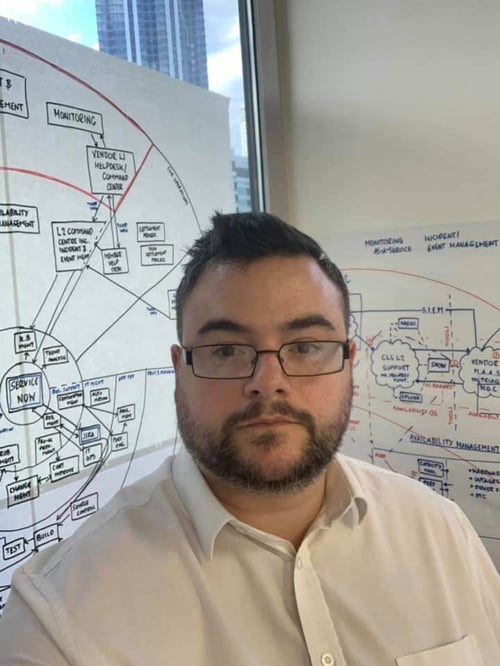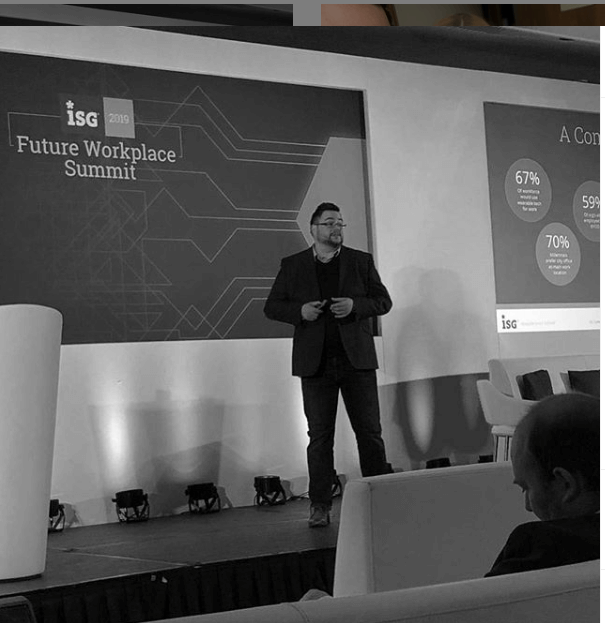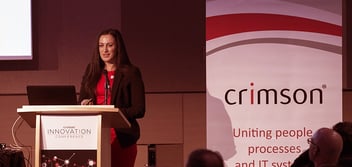Senior Spotlight: November 22
Crimson’s Head of Customer Engagement, Chris O’Brien, interviews senior technologists across the UK. Discover what drives these individuals as we delve into their careers, most exciting projects, and tech predictions for 2022 and beyond. Be inspired by their stories and connect with your IT peers.
Mario DeCristofano | Delivery Manager & Midlands Delivery Capability Lead, BJSS
Tell us about your role and the company you work for?
"I'm Mario, a capability lead and delivery manager for BJSS. I run a little side hustle that does IT, website software applications, consultancy, and that kind of thing.
I've been with BJSS now for over three years. We're the biggest privately owned IT consultancy company in the UK. I'm there predominantly to help shape the standards of how we do delivery management.
What is delivery management? It's delivering IT projects. It might be rolling out a piece of software, building a managed service, or a digital transformation. I look after delivery managers and teams that do that, and I do it myself, so that keeps me busy. I'm often involved in public and private sector work. Both are very different in terms of project size and feel. With the economy and the UK's posture at the minute, politically and socioeconomically, it's an interesting conversation how the public sector engages with consultancies.
I'm into agile transformation, so I do a bit of that privately. I also build and write websites and software; I've done that for 20 years. It makes me a better delivery manager if I can talk practically about technology rather than academically. You want to be a trusted advisor to clients, whatever business you're in. I can draw on the experience and the mistakes I have made, not what a book says. We do that well at BJSS, we're practical doers, and I think that is why I found a home at BJSS."

What’s the culture like at BJSS?
"It's unique in terms of having genuine empowerment to do good stuff and build. And I'm involved in shaping the community around our delivery managers to ensure that we've all got something to swarm around regarding standards and who we are as human beings. We treat our projects like that; it's almost like a pub beer test. Would you have a drink with this person in the pub?
In the consultancy world, that laser honesty is essential, even if it's to your commercial detriment. Of course, we've all got commercial targets to hit and bills to pay but doing the right thing for people should be above all that; BJSS echoes my values.
I rarely stay in one place; I doubt I'll be leaving BJSS in the next decade, I'm happy here. I'm also looking for more delivery managers at the minute, so get in touch."
How did you get to where you are today?
"I knew what I wanted to do when I was seven or eight. My parents supported my passion for computers and brought me the equipment. I started writing software, and between nine and eleven, the teachers at school were asking me to show the other kids how to use computers! My first job was as a system administrator at a local architectural firm. I struggled with college because I worked at a pace where I wanted to do more quickly and felt I could learn on the job quicker. Over the next three years, I worked my way up, making mistakes and growing.
I then went to London, working for big and small firms across different verticals, including telecoms, entertainment, and visual effects. I travelled, became interested in managing IT, and realised what I enjoy and what I'm good at. Then I got into project management, agile, and finally, the murky world of consulting about seven years ago. I've got two young daughters, I wanted to find a bit more balance, and that’s when I found BJSS. I jumped straight on a public sector client on day two, and just fell in love with what I was doing."
You worked as a contractor for a while?
"Yeh, I transitioned at the right time; IR35 was in the foreground. It was becoming a difficult for contractors to earn money. I've done talks for newbie contractors; it takes time to make a sustainable success. I had a good two years, but I'm glad I made my decision.
Consultancy sits right in the middle between contracting and full-time employment. If I could do things again, I would first work for a consultancy firm, which would be an easier jump into contracting, which is pretty much self-employed.
When I was looking to become a contractor, I found the lack of support from some firms scary. When you're transitioning, you need that arm around you, and you need almost to feel like you're employed, even though it's all on you.
I've done blog posts and ten things that I think, as a new contractor, you should do that I didn't. One of the things I noticed was, at least with Crimson, it felt like there was a constant I could go to if there was a pay issue, invoicing, because that's the biggest concern, right? But you were always there, particularly Angela and Karen; shout out to them, they were brilliant.
I know that's only the case for some. So yeah, working for a consultancy firm is the best of both worlds."

What has been your biggest challenge in your career to date?
"Finding what I want to do has been my biggest challenge; now I’m a certain age, I feel like I have found my purpose.
I've flip-flopped quite a lot; If you look at my CV, I've done 12 months here and 16 months there, and 22 months there, I don't regret any of that because I wouldn't be where I am.
Looking into the future, the challenge I face is whether I will be brave enough to go it alone. I constantly wrestle with that decision. There have been times and junctures, even at BJSS, where I'm involved in the world of startups. I'm on the board of a couple of startups that I advise, and sometimes the questioning to me is almost, "Well, why don't you do it alone?" And even as confident as I am about what I do, I still don't know enough.
From an industry perspective, it's interesting to watch how consultancy changes the economy of how companies are or are not paying for consultancy firms. Crimson was involved in the NASH Squared state of a digital document; it's a helpful snapshot of what's happening in the industry. But my observations are that companies ten years ago were all going through digital transformation programs, adding on-premises equipment. I talk about this all the time to our tech people. They've got on-premise servers and kit, and they're doing a cloud migration. As part of that comes a cultural transformation, they were starting that 10, 12 years ago, and everyone was talking about agile. You've got to be agile; you've got to do DevOps. So, we get to 10, 12 years later, if you ignore two years' worth of pandemic, whether it's gone well or not, most of those companies are now, to some degree, in the cloud.
With the cloud comes a new set of problems: different types of unmanageable billing because they're getting billing from cloud companies; they don't know what they're spending. The types of people that they need to manage cloud infrastructure is entirely different. So, what do you do? You're wheeling the consultancy firms, which isn't against the big six or anyone. But as a consultant, and BJSS does this well too, we go into the practicality of things. C-level teams want something other than a 52-page slide deck on what agile is. They don't have as much money as they had before; they need outcomes, and it's about understanding that outcome and delivering it.
Some consultancy firms are still getting it wrong with the types of consultants coming through, they are money driven, and therefore their behaviors are linked to the wrong thing. For example, several people have asked me, "What's the highest-paid part of technology I can get into?"
I'm looking for delivery managers but noticed a skills gap, and people are not used to consultancy life. If you think about the commoditization of tech, it's everywhere; admin teams are managing SharePoint servers, accounts are building a finance app. It's slowly becoming a mess, and that's a real challenge."

What trends do you see impacting IT in the next 3-5 years?
"I talked earlier about cloud and commoditization. The problem is you get this sprawl of unprotected, unsecured infrastructure within companies. So, what do you see on the back of that? You see increased cyber-attacks. And I don't have any stats to hand, but I know that ransomware and cyber-attacks have increased and increased and increased. It was 700 million events in last year alone, off the top of my head. We're going to see more loss of data, more public ware attacks on the public sector, and there's going to be a lot of recovery around that. So, therefore, the need for cyber firms and consultancies will grow.
People are finally getting their heads around what benefit cryptocurrency can be, and I've also been working on projects involving blockchain. The word blockchain has been on the hype cycle for about five years, it's always been there as a technology, but I'm starting to see some of that, ironically from a security perspective as well.An awakening is starting, and clients realise they need consultants and delivery managers.
VR is also going to be up there. Apple is releasing; what is it? Apple view. It is getting better; some of the latest VR stuff is just out of this world. Apple released some glasses and augmented reality is already a thing. I think it's just kind of re-imagining companies."
Want to participate in our Senior Spotlight? Email: chris.obrien@crimson.co.uk
Contact Christine Dineen Christine.dineen@crimson.co.uk for the latest market info, salary guidance, and help with your senior executive appointments.
Crimson is an IT consultancy, an IT solutions provider, an IT recruitment agency, and a Microsoft Gold Partner operating across the UK.


